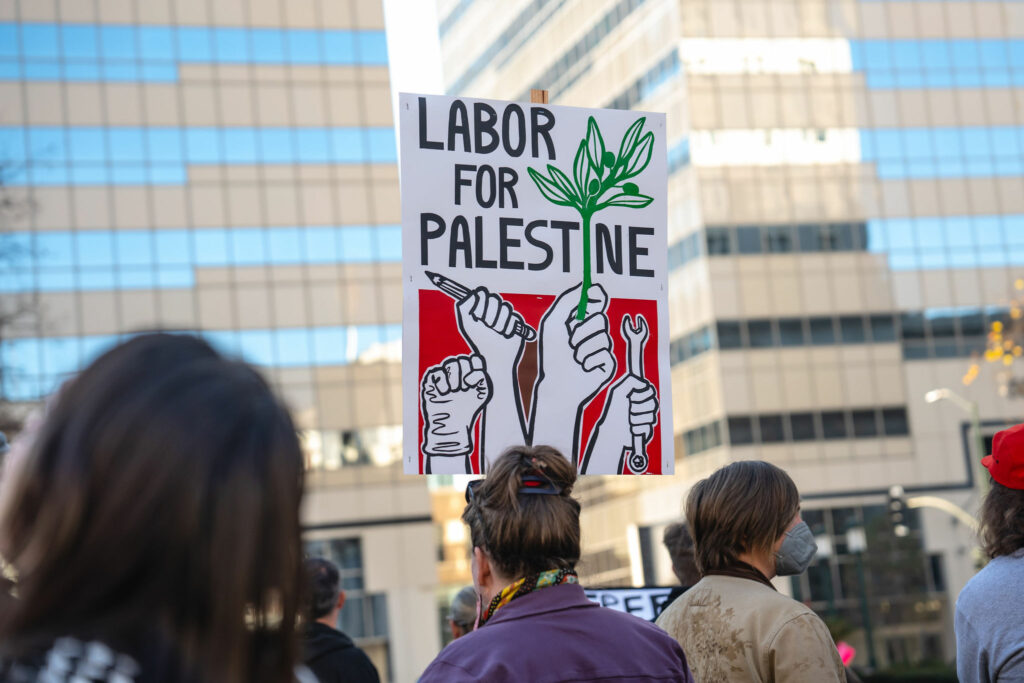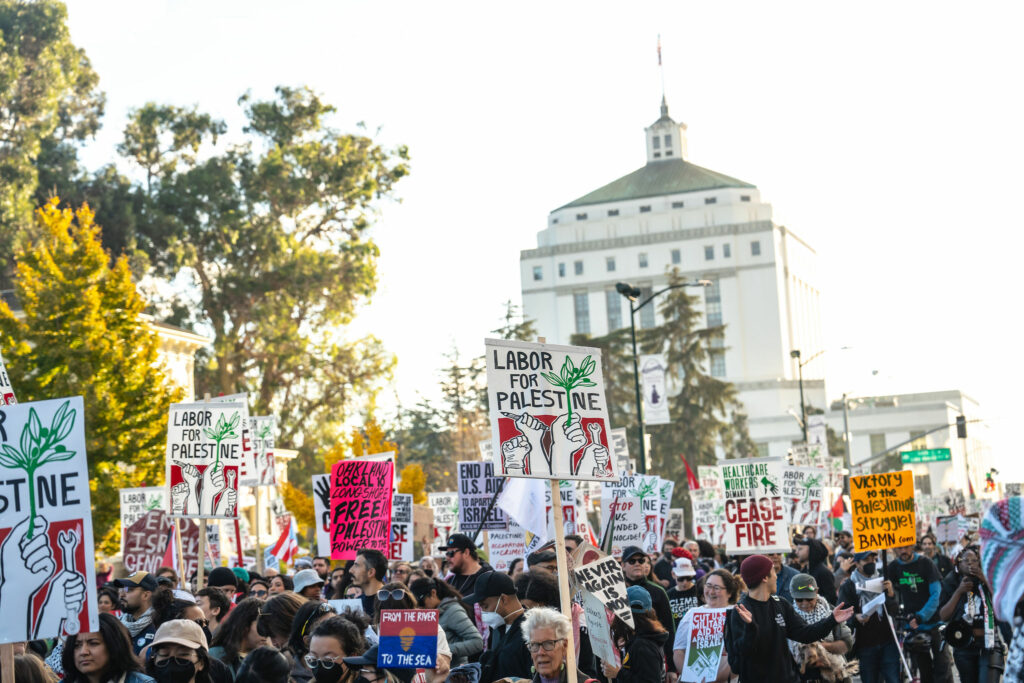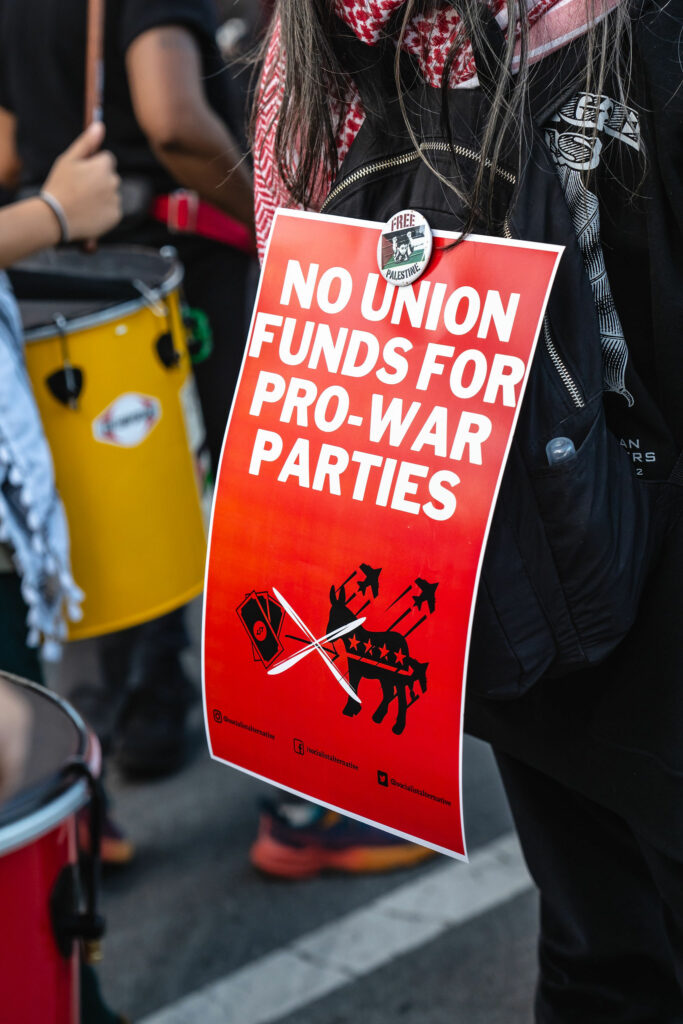Since October 7th, 30000+ Palestinians have been murdered by Israel in its devastating bombing campaign & invasion of Gaza. These horrific actions have triggered unprecedented global mobilization in support of Palestine. Millions of people have hit the streets, all demanding a ceasefire and an end to the occupation of Gaza. However, these calls have been entirely ignored by the Israeli government, the United States and their Western allies. Rather, Western political and corporate leadership (to the extent that these are separate categories) have rallied together to endorse, fund and even run cover for Israel’s war crimes in Gaza.
This complicity is particularly evident in the tech industry. The largest tech companies provide Israel with the technological means to implement its mass bombing campaigns. Our industry generates billions in revenue at the expense of innocent Palestinian lives. Despite that, for as long as tech executives and venture capitalists have been profiting off of apartheid, tech workers have been organizing in resistance to it. That tradition continues to this day.
In this critical moment of heightened political engagement, tech workers are demonstrating increased activism. Particularly in the movement for Palestinian liberation, many workers are participating in external actions such as protests, vigils, and teach-ins. However, there exists a sense of isolation within the workplace. It’s often challenging for politically active individuals to connect their struggles with like-minded colleagues in their professional lives.
Further, when Palestinian solidarity emerges in the workplace, we’re witnessing management crack down. We’ve seen this suppression manifest through the one-sided censorship of pro-Palestinian voices on company channels and the distribution of internal memos that deliberately ignore Palestinian suffering.
For these reasons, it is incumbent on us as tech workers to organize in our workplaces, connecting workplace solidarity with the broader cause of Palestinian liberation. We will not be complicit in apartheid. We will not be complicit in genocide. This guide is intended to be a starting point, to help you get started with organizing in your workplace and understanding your rights when doing so.

Organizing in the Workplace for Palestine: Quick Start Guide
1. Identify Allies and Connect Through Company Channels:
- Identify other politically engaged individuals within the workplace by leveraging existing company channels. Be aware that your employer is able to access your communications in these channels and exercise appropriate caution.
- Utilize Slack, email relevant mail-groups (e.g., Muslim resource group, religious resource groups, etc.) to identify potential allies.
- Initiate the process by posting a message that invites like-minded individuals to join a dedicated private group focused on discussions around Palestinian solidarity.
Template for Company Channels Message:
Subject: Join a Dedicated Group for solidarity around Palestine.
Hi [“team” or workplace-specific alternative for team], in light of the current events surrounding the horrors being inflicted on Palestinians, we are forming a group to create a safe space for open discussions. If you are interested, please join us on [chosen communication platform] using this [link or contact details].
Let’s support each other through these difficult times.
2. Shift to Secure Communication Platforms:
- Recognize the sensitivity of discussions around Palestine and create a secure space for open dialogue.
- Transition the conversation to platforms like Signal or WhatsApp, that are not managed by your employer, depending on the prevalent tool within the group.
- Lock down the group chat, such that new members must be explicitly approved by an admin, to maintain confidentiality and control membership access.
3. Conduct 1:1s to Build Trust:
- Schedule individual calls with group members to break the ice and create a conducive environment for open discussion.
- Building trust through personal connections is vital for fostering a strong collective effort.
- The ultimate goal is to conduct one-on-one meetings with individuals within the group to understand their perspectives, motivations, and identify shared issues related to Palestinian solidarity.
- Larger group calls can be great icebreakers and open the door to more 1:1 conversations.
- Some of your coworkers may have prior organizing experience or connections to outside groups that could be helpful, or have ideas for organizing or direct action within the workplace- these 1:1 conversations are a two-way street for you to get to know each other and begin to brainstorm!
- This is an incredibly difficult time for many of us. By connecting in this way, we help lift each other up and build supportive relationships that are few and far between in our workplaces.
4. Keep Sensitive Discussions Limited to ICs (Individual Contributors) and Non-HR:
- Recognize the potential risks associated with including managers and HR in discussions around sensitive topics like Palestine.
- Establish a wide-net discussion forum initially to avoid raising suspicions, then create a separate forum excluding managers and HR where discussions can be more candid.
- Even though some people in management or HR might be strong allies on this issue, or even personally affected, their positions with respect to your employer are fundamentally different from an IC’s, and being part of the most sensitive organizing conversations may put them or you in a very difficult or vulnerable position. This has nothing to do with who they are as people! But the structure of the workplace dictates that their relationship to your bosses, and your relationship to your bosses, are structurally different and come with different risks, incentives, and pressures.
5. Take Small Collective Actions:
- Initiate small, collective actions within the workplace to raise awareness and show solidarity.
- Examples include updating Slack photos and statuses or posting together on company channels. Even simply saying the term “Palestine” on company channels can be a major step forward in some workplaces. These seemingly small collective actions are often the start of greater solidarity.
- Expand actions beyond the workplace by collectively attending city-wide protests or actions to build trust and solidarity.
- One of the most impactful collective actions we can be taking in the workplace is to identify and document the ways in which the company is complicit in Israeli war crimes.
- As workers, we are uniquely situated to understand this complicity. However, this knowledge is often dispersed amongst the workforce with any given worker only having a small, isolated piece of the broader picture.
- In your solidarity group of coworkers, you’re likely to find representation from many different departments and functions at your company. By bringing these folks together, you’ll now be able to discuss questions such as:
- Who are our vendors?
- Who are our customers?
- Who uses our technology and what do they do with it?
- What data do we store?
- What do we do with this data?
- In doing so, you will all collectively gain a much broader understanding of your company’s relationship to the ongoing conflict and perhaps others.
- Further, by consolidating and documenting this knowledge, your group may identify opportunities for collective actions you may take in the future.
By identifying politically engaged individuals within the workplace, creating secure communication channels, conducting personal 1:1s, and initiating small collective actions, tech workers can effectively connect workplace solidarity with the broader movement for Palestinian liberation. These best practices lay the foundation for a united and impactful collective effort within the workplace.

Where You’re Protected
The reality of U.S. labor law is that there are few protections for political speech in private workplaces. Legal outcomes are also highly case-specific and depend on the evidence you can present for why you were wrongfully fired, demoted, or otherwise retaliated against. Nevertheless, there are portions of labor law that offer workers some protection. It is important to be aware of what kind of activities they cover to stay protected. Below is a brief overview that we hope will encourage you to dig deeper and seek legal advice if you believe a particular category of protections applies to your organizing.
🍉 First Amendment Rights
The First Amendment protects the free speech of government employees if they are speaking as private citizens about a matter of public concern and their speech does not interfere with their work. “Public concern” includes broader social and political issues. Workers should steer clear of using any government platforms to speak out or presenting themselves as representatives of any government institutions. In cases where there may be any doubt, e.g. a social media account that includes your job title, make it clear that your views are your own. The ACLU has a useful flowchart that outlines possible exceptions to this rule.
Unfortunately, there are no such federal protections for employees of private companies. There may be some protections depending on your state, however. California, for instance, says that employers may not prevent their employees from participating in the political arena. New York prohibits discrimination against political activities that take place outside the workplace and off-duty. Oregon has a Worker Freedom Act that does the reverse– it prohibits employers from requiring employees to attend political meetings or distribute political communications. The Council on American-Islamic Relations offers some resources and consulting to help activists understand their state laws.
🍉 Discrimination
A number of state and federal laws, most notably the Civil Rights Act, protect against discrimination based on protected classes, which include religion, race, and nationality. Notably, this applies in cases of hiring, firing, and promotion or receiving any other kind of employment-related benefit. The Equal Employment Opportunity Commission handles charges of discrimination and maintains a well-resourced site that answers questions about what constitutes discrimination.
Discrimination may occur as a result of participation in political protest. For instance, if your employer uses racial, ethnic, or religious slurs against you in the aftermath of your political activity, you should keep careful documentation of the incident and find witnesses to the event, if possible. If you then experience any kind of retaliation, you may have a case against them. You are also protected if you discuss incidents of discrimination with other employees, including asking if they have experienced similar issues (see the next section). There are ways to file a charge with the EEOC anonymously. Legally, an employer may not retaliate against you for filing a charge even if you do not file anonymously.
🍉 Organizing to Improve Working Conditions
Workers in the U.S. are protected when they speak out about working conditions to their coworkers through Section 7 of the National Labor Relations Act. You do not need to be a member of a recognized union or any other organization to exercise these rights. Working conditions include discussions about pay and benefits, working hours, and workplace safety and surveillance.
While your political organizing itself may not fall under protected concerted activity, if you are being abused or surveilled by your manager and you discuss these issues with other employees, those discussions are protected. If you experience retaliation as a result of your discussions with other employees about your workplace safety and surveillance, you may have a case under the NLRA. In one case of non-profit employees in California (31-CA-093108) employees complained about a verbally abusive manager and then were fired two days later. According to the NLRB, the conversation between the employees’ constitutes protected activity.
This law does not protect you if you make disparaging comments about your employer that are not related to working conditions or if you are spreading misinformation. If you believe you have been retaliated against for activity that is protected under the National Labor Relations Act, you may want to consider filing an Unfair Labor Practice (ULP) charge with the National Labor Relations Board. This process grants you certain legal protections and can help you win back-pay and potential reinstatement for wrongful termination.

Best Practices if You Experience Retaliation
Protesting and organizing against your own company’s contribution to war is only one of many ways to support the worldwide solidarity campaigns for the people of Palestine. Joining in direct actions and protests organized by groups in your community is a great way to be involved outside of the workplace. Even if your company doesn’t have direct ties to ongoing military efforts, there are many ways you can stand in solidarity with Palestinians.
🍉 What We’re Seeing on the Ground
That being said, we are seeing escalating professional retaliation against doctors, law students, and journalists, who are being fired or forced to resign after expressing solidarity with Palestinians. We are also seeing suppression of pro-Palestinian speech in the tech industry. Even workers who are not protesting their own company’s contracts with Israel or the IDF, at workplaces where no such ties are present, are facing reprimands and the threat of firing for exercising pro-Palestine speech on their own social media pages or on company Slack channels. The policies cited in each of these cases of retaliation are nebulous at best, and weaponize bad-faith accusations of antisemitism or claim that pro-Palestine speech is support for “terrorism”. These tried and true McCarthyist tactics are used to silence pro-Palestinian speech.
🍉 Organizing Against Retaliation
One way to stand in solidarity with Palestine in your workplace is to organize to defend yourself and your coworkers from professional retaliation for pro-Palestine speech, both at work and on your personal time. Protecting each other so that you can all speak up about injustice creates space for continued public outrage about the genocide happening in Gaza, which is necessary for moving public opinion further and changing the political situation. Free speech is necessary for this movement, and retaliation in the workplace is an effective silencing tactic. Fighting against this silencing is crucial.
This could look like organizing an “emergency retaliation response committee” that can support a worker pulled into a disciplinary meeting and advocate on their behalf. It could even look like organizing a solidarity pledge that your coworkers can sign, saying that if any of you are fired for exercising free speech on this issue, you will strike until those workers are reinstated, making it clear to your bosses that an injury to one is an injury to all.
🍉 Retaliation Support and Resources
If you experience retaliation, you don’t have to go through it alone. Reach out to trusted coworkers as soon as you can to let them know what’s going on- your coworkers care about you and will want to help! At the very least, many of your coworkers will be angry about unfair retaliation. Supporting each other begins with sharing information, and then you can form a group that can brainstorm what kind of collective actions you can take together to defend your job. You also have legal recourse. If you are in a union, your union’s stewards or grievance officers can help you file a grievance and possibly an unfair labor practice charge against your employer. If you are in a union you also have “Weingarten rights,” meaning that you can take another member of the union with you into all meetings that you think might result in your discipline.
Regardless of whether you are in a union, you can reach out to Palestine Legal or Council on American-Islamic Relations that are collecting reports of professional retaliation for pro-Palestine speech and organizing. These organizations can provide guidance and/or legal help. If you are worried about doxxing, Palestine Legal put together a resource on the best practices for protecting yourself and your personal information.
Are you a tech worker who is interested in organizing within your workplace for Palestine?
Are you already organizing and seeking support or connections with like-minded peers in the industry?
Reach out to us at collectiveactionintech@protonmail.com and we’ll do our best to help!
Additional Resources
- Palestine Legal’s: Legal Resources for Activists
- Palestine Legal’s compiled list of resources for activists advocating for Palestine in the US
- National Labor Relations Board
- The National Labor Relations Board offers numerous resources on its policies, including an online database of cases and decisions.
- U.S. Equal Employment Opportunity Commission
- ACLU Federal Employee and Free Speech Guide
- Guidance to U.S. Employees in Response to Islamophobic and Anti-Palestinian Rhetoric in the Workplace
- When Employees Become Activists
- A guide written for employers that offers a useful recap of approaches employers are legally allowed to take following activism.
- What to Do If An Employee Is Arrested During a Protest
- Again, from the perspective of employers, but a useful guide to what you as an employee might expect
- Rules for Whistleblowers: A Handbook for Doing What’s Right
- While this book was written for whistleblowers, many of the resources for documenting retaliation will be helpful for workplace activists as well.
- Emergency Workplace Organizing Committee
- Reach out to EWOC to get connected to experienced tech worker organizers who can support you in organizing collective actions (or even a union!) in your workplace.
- Collective Action In Tech
- Email us with any questions related to organizing in this moment and we’ll do our best to point you in the right direction!
The team behind Collective Action in Tech
-
The Editorshttps://collectiveaction.tech/author/collectiveactionintech/
-
The Editorshttps://collectiveaction.tech/author/collectiveactionintech/
-
The Editorshttps://collectiveaction.tech/author/collectiveactionintech/
-
The Editorshttps://collectiveaction.tech/author/collectiveactionintech/
